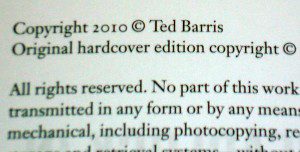 One day last winter at the college where I teach, I stood waiting for a copier/printer to complete a job so that I could photocopy a letter. Initially, I paid little attention to the pages landing in the printer discharge slot.
One day last winter at the college where I teach, I stood waiting for a copier/printer to complete a job so that I could photocopy a letter. Initially, I paid little attention to the pages landing in the printer discharge slot.
Then I noticed the material was repeating itself. Every third page was identical to the one printed three pages earlier. The photocopied pages, I noticed, came from a book. The printer kept spitting out the sequence until nearly 50 versions of the same three pages had piled up. Somebody somewhere in the building was copying the book excerpt and planning, I guessed, to circulate copies among students. The person didn’t realize the copying was happening at this printer in my corner of the college, because he never came to pick up the copies.
“Who would waste all this paper?” I thought.
Then, I got even more ticked off that the person doing the mass printing was simply ripping off the author – copying all those pages and giving away the content for nothing. Lawyers call it a breach of copyright.
According to Tony Clement, Canada’s industry minister, however, I did NOT witness a breach of copyright.
Last Wednesday, Clement unveiled new copyright legislation (the first in 13 years). Bill C-32, he said among other things, will crackdown on consumers who share electronically recorded books, music on CDs, movies DVDs and digital video games. The practice is known as breaking “digital locks.” To emphasize the point, the minister announced the new provisions of the copyright bill during a press conference at a video-game production facility in Montreal.
“Piracy destroys billions of dollars of value per year,” Clement told reporters on Wednesday. Under the new bill, companies could seek damages of between $100 and $5,000 from those who “break digital locks” to copy material such as video games and music for potential commercial gain.
That’s all well and good for the creators of CDs, DVDs and video games. But what about that author whose book was being ripped off at my college?
As it turns out, proposed changes in the same Bill C-32 will allow educational institutions even more free access to the content of trade books and magazine articles, i.e. unlimited copying. In other words, the law will expand the unpaid uses of copyright material for educators and students. The provision is called “fair dealing.”
Fair dealing (or fair use) in copyright legislation permits some copying and distribution without permission of, or payment to, the copyright holder. Since the 1990s, Canada’s fair dealing clauses have allowed private copying for personal use in such areas as research and study, review and critique, parody and satire, news reporting and legal advice.
Among the greatest number of “fair dealing” users – it’s clear – are teachers and students at schools, colleges and universities. In the classroom, fair dealing essentially turns a blind eye to copyright. According to the federal minister, Bill C-32 would broaden fair dealing to shield institutions from increased costs for education. It would have the opposite effect on writers.
Coincidentally, this past weekend I was in Ottawa for the annual general meetings of the Writers’ Union of Canada, the 37-year-old organization representing 2,000 published authors across the country. Not surprisingly, the new provisions of Bill C-32 became a hot topic among the hundreds of writers attending the sessions. At one impromptu meeting, I sat with fellow authors Bill Freeman, Heather Menzies, Rudy Wiebe, Susan Crean, Graeme Gibson and Margaret Atwood. They were not happy with what could translate to an 80-per-cent loss of existing reprography income from educational institutions. Atwood did not mince her words.
“If the city wanted my garage to suddenly build a heliport, it would still have to compensate me,” she said. “This is nothing less than an expropriation of our property.”
Ironically, the term copyright literally means “the right to copy,” when in fact the laws associated with copyright guide people as to what cannot be copied. The concept of copyright, known in the English-speaking world as the Statute of Anne (after Queen Anne), has been around since 1710. An international convention, at Berne, Switzerland, in 1886, paid particular attention to authors as “the key figures in copyright law” with the specific purpose being “the protection of the rights of authors in their literary and artistic works.” Canada recognizes the Berne Convention.
According to Minister Clement, the new legislation he unveiled at the Montreal game company this week will help some Canadians feel less guilty about downloading their favourite music to an iPod. It may, however, further erode the copyright that has provided income to its original rights-holders – writers – for exactly 300 years.
As I write this, I can almost hear that college printer grinding out another 50 so-called “fair use” copies.